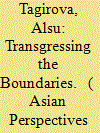| Srl | Item |
| 1 |
ID:
172994


|
|
|
|
|
| Summary/Abstract |
This article argues that the advent of the technological system of CinemaScope in socialist China should be understood as a historical product of the specific material, cultural, and political conditions and configuration of the Cold War. On the one hand, it is the cultural network of the communist bloc that enabled China to obtain this new technology of media infrastructure. On the other hand, the social discourse of CinemaScope embodies the Manichaean Cold War narrative that worked to justify the political-ideological supremacy of communism by articulating a technological modernisation superior to the capitalist model. What is more, CinemaScope also bespeaks the logistics of perception that effectively turns people’s perceptual experience into a political battlefield of the Cold War.
|
|
|
|
|
|
|
|
|
|
|
|
|
|
|
|
| 2 |
ID:
166878


|
|
|
|
|
| Summary/Abstract |
In spring 1962, 60,000 individuals fled from northern Xinjiang into the Soviet Union. Known as the “Yi–Ta” incident, the mass exodus sparked a major flare up in Sino-Soviet relations. This article draws on declassified Chinese and Russian-language archival sources and provides one of the first in-depth interpretations of the event and its aftermath. It argues that although the Chinese government blamed the Soviet Union for the Yi-Ta incident, leaders in Beijing and Xinjiang also recognized the domestic roots of the disturbance, such as serious material deficits in northern Xinjiang and tensions between minority peoples and the party-state. The Chinese government's diplomatic sparring with Moscow over the mass exodus reflected Mao Zedong's continued influence on Chinese foreign policy, despite claims by scholars that Mao had retreated from policymaking during this period.
|
|
|
|
|
|
|
|
|
|
|
|
|
|
|
|
| 3 |
ID:
170645


|
|
|
|
|
| Summary/Abstract |
The author shares her memories of meetings with some CPC leaders in the 1950s. She offers both personal portrayals and brief assessments of the state of Sino-Soviet relations at the time. ... Keywords: Sino-Soviet relations, Far East Sector of the Foreign Policy Section of the CPSU Central Committee, Liu Shaoqi, Song Qingling, Yang Xianzhen. ... Upon graduating from the Moscow Institute of Oriental Studies (the China Department) in 1947, the first job I took as a China expert was at Research Institute 205 where I was taken on first as a translator and then as a junior adviser..
|
|
|
|
|
|
|
|
|
|
|
|
|
|
|
|
| 4 |
ID:
161500


|
|
|
|
|
| Summary/Abstract |
After World War II, suffering from a severe workforce shortage and unprecedented economic devastation, the Soviet Union encouraged the immigration of Chinese citizens from Xinjiang into Soviet Central Asia. Despite the arbitrary behavior of local authorities, the immigrants were successfully integrated into Soviet society. But after 1963, many of the Chinese “defectors” began to be considered a threat to national security, and the KGB (Committee of State Security) arrested a good number of them. I argue that the Sino-Soviet split affected the mentality and immigration policies of the Soviet Union, much like current relations between China and the Central Asian states shape the attitude of the latter toward new arrivals from China. This article is based on research in the Kyrgyz and Kazakh archives.
|
|
|
|
|
|
|
|
|
|
|
|
|
|
|
|